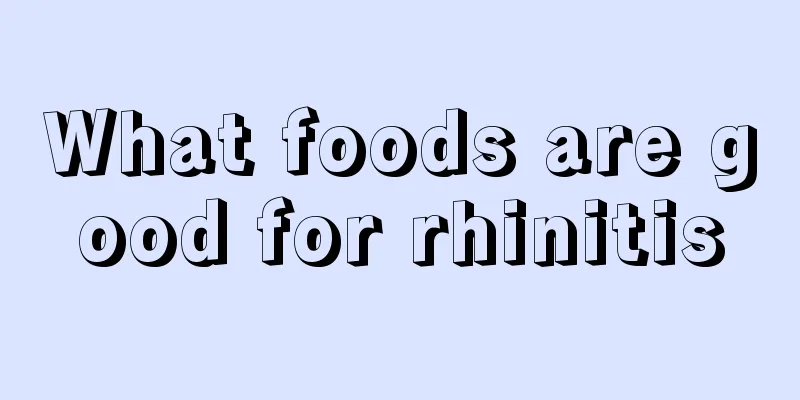What foods are good for rhinitis

|
Patients with rhinitis should eat more foods that help recover from the disease during an attack of rhinitis, so as to effectively reduce the discomfort caused by rhinitis to the body. During the treatment of rhinitis, patients with rhinitis will also find that rhinitis is a disease that is very difficult to cure completely, and the development of rhinitis can only be controlled by medication. Therefore, many other patients will also look for foods that help recover from rhinitis. 1. Pineapple The bromelain contained in pineapple can not only help cold patients relieve sore throat and cough symptoms, but also effectively break down protein in food, increase gastrointestinal motility, and enhance the body's immunity. 2. Citrus: Eating very sour citrus fruits together with honey, or squeezing citrus juice, adding honey and then drinking it with boiling water, is very effective in treating dry nose. 3. Sugarcane: Sugarcane is cold in nature, sweet in taste, and can clear away heat and promote salivation. Sugarcane has the effect of "relieve throat". When you have a sore throat, dry mouth and cough due to a wind-heat cold, eating sugarcane can clear away heat and relieve throat and alleviate symptoms. 4. Pears Pears are cool in nature, sweet in taste, and can promote salivation, clear away heat and resolve phlegm. It has a significant alleviating effect on symptoms such as wind-heat cold, fever, dry mouth, cough and sputum. Patients with wind-heat cold can use a raw pear, wash it, cut it into pieces with the skin, add rock sugar and stew it in water to take orally, which will have a good therapeutic effect. 5. Flammulina velutipes: This is also a food that helps prevent allergic rhinitis. Regular consumption of enoki mushrooms helps eliminate heavy metal ions and toxins and waste produced by metabolism. 6. Carrots Recently, Japanese experts have discovered that beta-carotene in carrots can effectively prevent allergic reactions such as pollen allergies and allergic dermatitis. 7. Honey It is best to drink a spoonful of honey every day. Because honey contains trace amounts of bee venom. It is clinically used to treat allergic diseases such as bronchial asthma. Honey contains a certain amount of pollen grains. Drinking it regularly can develop a certain resistance to pollen allergies. 8. Jujube: Japanese scholars have found that red dates contain a large amount of anti-allergic substances - cyclic adenosine monophosphate, which can only temporarily prevent the occurrence of allergic reactions. It is better to break the jujube into pieces when decocting in water, and it is not advisable to add sugar during the decocting process. |
<<: Can you eat the iron stick yam when it turns purple?
>>: What vitamins are missing for rhinitis
Recommend
What are the dietary taboos for lung cancer?
What are the dietary taboos for lung cancer? Pati...
What's wrong with the newborn's urine having blood?
Many children are prone to various health problem...
What are the prevention and treatment methods for forest encephalitis
Forest encephalitis is an acute infectious diseas...
Which vitamin is lacking in hair loss, and what should I eat more of?
There are many reasons for hair loss, and lack of...
What harm will ovarian tumors bring to patients
What are the hazards of ovarian tumors to women? ...
Got a small patch on your head where no hair grows?
There are generally many reasons for hair loss. I...
What are the advantages and disadvantages of ejaculation outside the body
The so-called "extracorporeal ejaculation&qu...
What are the bones on both sides of the jaw called
There are a total of 206 bones in our body. Excep...
The dangers of homemade popcorn
Delicious popcorn always makes people feel more s...
Several common treatments for colorectal cancer
Colorectal cancer is a common type of intestinal ...
What effect does ovarian cancer have on the fetus
Many times, people do not pay attention to some m...
How to stay alert when you feel sleepy while reading
People are in a very quiet state when reading. Fa...
Eating too much or too hot food can easily lead to stomach cancer. People from which parts of the country are more likely to get stomach cancer
Gastric cancer seems to favor office workers, pro...
Can I have a physical examination when preparing for pregnancy?
Nowadays, everyone knows that they need to have g...
Can okra be eaten raw? How to eat okra
Okra can be said to be a food that is recognized ...









